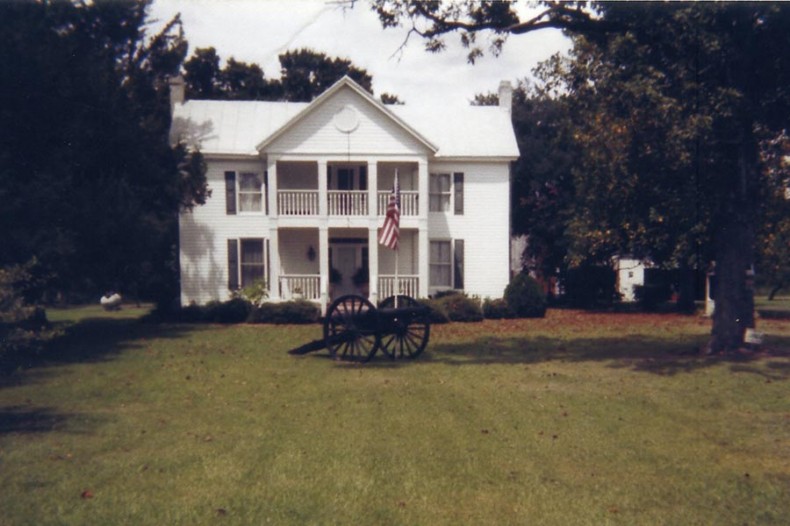All in the Family
Century Farms celebrate North Carolina’s agricultural heritage
By Carole HowellBetty Russell Rhem Farm, Craven County, established 1905.
Pride in their farms and in the state’s farm history has led nearly 2,000 families to earn the designation of North Carolina Century Farm for farms owned and operated by the same family for more than 100 years.
“Agriculture is North Carolina’s leading industry, with an economic impact of $78 billion,” says Brian Long of the N.C. Department of Agriculture and Consumer Sciences. “And family farms are the backbone of North Carolina agriculture. Of the more than 50,000 farms in the state, about 90 percent are family-owned. We owe a lot to the family farm.”
Brian Long tells us that the Century Farm designation began in 1970 at the North Carolina State Fair. To highlight the fair’s theme, “Salute to Agriculture,” fair officials sought families who have owned or operated a farm in North Carolina for 100 years or more. Every few years at the state fair, the NCDA&CS holds a reunion for all Century Farm families. The next reunion is planned for 2016.
“We continue to see a lot of interest in this recognition program,” says Long. “We typically receive at least six applications each month. That tells us that there are still a lot of family farms reaching the century mark despite development pressure.”
While some things change, some things remain the same. Some families continue to farm, while others are making use of their land in ways their grandparents would never have imagined. Each farm has its own history — as interesting as the families that own them.
![holbrook farm 1[2]](/images/stories/2015-07/holbrook-farm-1[2].jpg)
Cold Mountain Farm in Haywood County represents six generations of continuous family farming along the Pigeon River.
Cold Mountain Farm, Haywood County
William Holbrook grows tomatoes and tobacco on 15 acres in the Haywood County area of Bethel at the base of Cold Mountain. The 1914 house his grandfather built is still in use.
“My great-grandfather, William Harrison Hargrove on my mother’s side, obtained this farm when he married my great-grandmother,” said Holbrook. “I knew I was the fourth generation, but I learned that I was actually the sixth generation.”
Holbrook said that his father had done a great deal of research on his mother’s side of the family, and he developed a greater interest in genealogy as he began to dig deeper into the land’s history.
“Sometimes you discover there was a horse thief in the family,” Holbrook chuckled, “so there are some negatives about it.”
Burns-Lail Farm, Burke County
Not all farms grow crops or raise livestock. The Burns-Lail farm in Burke County, established in 1811, has been transformed into a country wedding venue, called Rex Allen Theater Events, hosting more than 70 weddings last year. The house built in 1954 is now used as a bridal suite.
“I tell people we farm marriages,” said Rex Lail, who says that the idea came from his daughter, Lisa. “We have to keep the place immaculate for our events, so I guess the only crop I’m really good at is grass.”
Besides the wedding events, the family produces an annual Christmas show as a gift to the community.
Smith Farm, Cabarrus County
“Our farm was part of the Phoenix Gold Mine,” said William Smith of Cabarrus County. “My grandfather and one of his brothers worked at the mine, and when the mine closed down, Cabarrus Land and Timber Company was formed and they sold the property. My grandfather bought this land, 74 acres, and bought his brother out in 1910 for a total of about 160 acres.”
Smith remembers that they got electric power from the Union electric co-op around 1950. “My great-uncle owned property across from ours, and the city of Concord had electricity over there. And my dad went over there and asked if they wo
uld pull power over here to our place. They said no, because it’s not cost-efficient to pull power a quarter of a mile to one little farm. The electric co-op came out of Union County and put the power in our house here.”
The city of Concord took notice. “Later on,” Smith added, “when they were putting in a large mobile home park across the road from us, Concord asked to run a line from my great-uncle’s across our land to those homes. My dad told them they couldn’t pay him enough to let them do that, because they hadn’t seen fit to electrify our farm years ago.”
Today the Smiths make the most of their grandfather’s investment. Over the years they’ve raised hogs, produced duck eggs, and now raise chickens for Tyson, about 190,000 at a time in eight growing houses.
Thrower Farms, Hoke County
Hal Thrower’s family actually owns two Century Farms: his mother’s family land in Robeson County, and his father’s family land in Hoke County.
“I believe the original deed goes back to the 1790s, and the old house has been there from about the 1880s,” says Thrower about the Jane Thrower farm. The Harold Thrower farm in Hoke County dates back to 1875.
Thrower leaves the farming to others. He is a field engineer for Lumbee River EMC.
-
Share this story:





